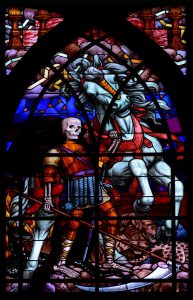Apocalypse

The End of the World
Frontline created a really remarkable show about Christianity called From Jesus to Christ a number of years ago. With the show came some extraordinary written materials from a whole variety of superb scholars about the history of the earliest Christians, including materials about the New Testament, about the historical Jesus, about gospels and epistles, and about the Apocalypse. A few quotes from these scholars will help set the tone for the chapter on Revelation.
From James Tabor[1]:
“If a modern secular reader … sat down and read it through for the first time, my guess would be they would find it to be extremely violent. Someone once tallied up the death count and projected it on a modern world such as ours, with five billion people, and it’s absolutely a horrible kind of a statistic. You come up with maybe four billion dying of famine, war, earthquake, plagues.”
From Paula Fredericksen[2]:
“One of the emotional satisfactions of having good triumph over evil is knowing how evil evil is. And one of the devices used by the author of the Book of Revelations is also something that happens in history. When evil is flourishing it’s very bad indeed. And what you get in Apocalypse is a vision of the suffering that people go through before the happy resolution.”
From Eugene Gallagher[3]:
“We can play “Pin the Tail on the Antichrist,” and find any number of people throughout history who have been so designated. We can say, “Who has the mark of the beast?” and get another long list of people. So the lush imagery and the complicated imagery of Revelation has been one of the things that has kept people reading it. Because it can always be renewed. It can always be applied to a new situation. ..”
Apocalypse is a tricky idea. The end of the world is a concept that people across cultures have grappled with, since there seems to be such horrific things that happen all the time. It can get so bad at times that humans feared, and still fear, that some day, life will just end on earth because the horrific things will be so bad that everything will just…blow? Disintegrate? Vanish? Explode? What might happen is up for debate across the years and cultures. In the Bible, 2 books are considered apocalyptic–Daniel and Revelation. In this text, the book of Revelation is going to be the primary emphasis, as apocalypse in that piece of writing has been used all across the globe to discuss, dissect and explain what “the end of the world” might look like!
Here is a little introduction to the concepts–very tongue in cheek, and very useful!
Tabor, James, et al. “Apocalypticism Explained | Apocalypse! Frontline.” Frontline: From Jesus to Christ, Public Broadcasting Service, https://www.pbs.org/wgbh/pages/frontline/shows/apocalypse/explanation/brevelation.html.
May, Herbert G., et al. The New Oxford Annotated Bible with the Apocrypha: Revised Standard Version, Containing the Second Edition of the New Testament and an Expanded Edition of the Apocrypha. Edited by Michael D Coogan, Oxford University Press, 2007.
Gabel, John B. The Bible as Literature: An Introduction. Oxford University Press, 2006.
- is a professor in the Department of Religious Studies at the University of North Carolina at Charlotte. He co-wrote Why Waco?: Cults and the Battle for Religious Freedom in America with Eugene Gallagher and is currently working on a new book entitled Last Days in Jerusalem: Jews and Christians at the Crossroads that deals with the apocalyptic events surrounding the destruction of Jerusalem and the Temple by the Romans in 70 C.E. ↵
- is a William Goodwin Aurelio Professor of the Appreciation of Scripture at Boston University. She specializes in the social and intellectual history of ancient Christianity. She is the author of From Jesus to Christ: The Origins of the New Testament and Images of Jesus and has written on conversion, apocalypticism and Jewish/Gentile relations in Late Antiquity. ↵
- is the Rosemary Park Professor of Religious Studies at Connecticut College. His publications include Why Waco?: Cults and the Battle for Religious Freedom in America, which he co-authored with James D. Tabor ↵
